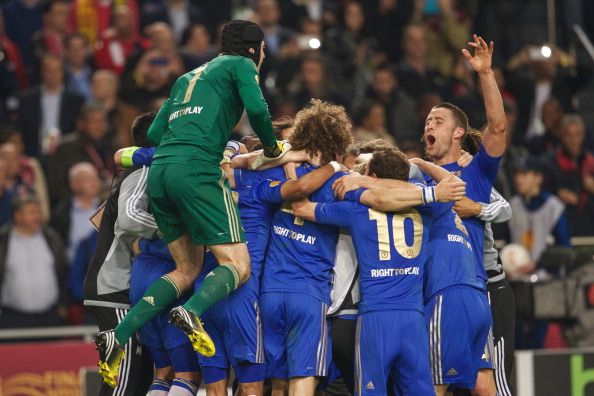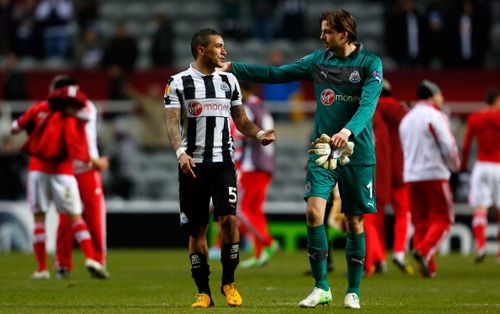
Europa League final reminds us that UEFA system is faulty

Chelsea lifted the Europa League trophy for the first time in the club’s history on Wednesday night as they saw off Benfica in a game of disappointing quality at the Amsterdam ArenA. And while most of the news surrounding the game focused on Chelsea’s achievement in winning back to back European titles and Rafa Benitez’s surprise success story, I couldn’t help but focus on something else. Both of the finalists were playing in the Champions League before Christmas.
There are many terrible rules in football, but there is one particularly troubling rule that UEFA have somehow concocted for the Europa League. Once the group stages of the Europa League and Champions League are over, the 12 winners and the 12 runners-up in the group stage of the Europa League will advance to the first knock out round. However, along with those 24 Europa League teams, all eight of the 3rd placed teams from the Champions League group stage enter into the Europa League at the first knock out round as well.
This year, that rule has moulded and defined the entire competition. The two finalists were former Champions League teams begrudgingly fighting for the consolation prize after being dumped from Europe’s premier competition. Not only that, but with Basel facing Chelsea in the semi-finals, 3 of the 4 semi-finalists were eliminated Champions League teams. That doesn’t seems fair, does it?
Chelsea’s victory is not the only time a Champions League ‘eliminee’ has won the Europa League. Back in the 2009-2010 season, Atletico Madrid went on to win it after finishing 3rd in their Champions League group that year. They fought past Liverpool, Valencia and Fulham on the way to their first Europa League crown.
Frankly, given the obvious unfairness of this rule, it’s amazing that UEFA ever allowed it. For example, this year Newcastle United, who had done extremely well to qualify for the Europa League in last season’s EPL campaign, battled their way to the Europa League quarterfinal stage to the surprise of most. In that quarterfinal tie, they had to face Benfica, a team with Champions League pedigree who were clearly the superior side.
Had the rule not existed, and Benfica not been allowed to come into the Europa League, Newcastle may well have faced Bordeaux instead (who they had beaten 3-0 at St James’ Park in the group stages in October). Or perhaps they would have faced Fenerbahce or Dynamo Kiev. Of course, these teams are still formidable competition; such is the nature of the tournament. But they would be much more balanced tests than facing Benfica, who were too good to have qualified for the Europa League in the first place.

It must be admitted, however, that some teams in the Europa League are actually better teams than those who finish 3rd in the group stages of the UCL. Given the varying strength of the European domestic leagues, this is almost inevitable. This season, Atletico Madrid competed in the group stage of the Europa League. They will finish this season as the third best team in the Spanish league, falling behind only two powerhouses of European football, Barcelona and Real Madrid. It would be almost unanimously accepted that Atletico are a much stronger outfit than FC BATE Borisov and CFR 1907 Cluj, who were two of the 3rd placed Champions League group stage teams this year. Therefore, that could well be used as an argument to contradict the supposed unfairness that the rule causes to Europa League teams. Any team would much rather face BATE than Atletico Madrid after all.
However, there can be no such argument made against the unfairness caused to UCL teams. Due to the backward nature of the rule, many UCL teams condemn themselves to a trophy-less season just by being good enough to qualify out of the Champions League group stages.
Shakhtar Donetsk, a Ukrainian side who are starved of European success, fought tooth and nail to qualify ahead of Chelsea in the Champions League Group E. On the balance of their performances, they deserved to go through as well. However, I think it would be fair to say that Shakhtar never had any realistic expectation of winning the Champions League. Yet somehow, in beating out Chelsea, the Ukrainian side destroyed their chances of a successful European campaign, whilst handing Chelsea an opportunity that would eventually lead to their first Europa League title.
For teams like Shakhtar, Galatasaray and Celtic, finishing in 2nd place in the group stages this year was potentially a veiled curse. While each team made 3.5 million euros, they could have earned 5 million euros had they gone on to win the Europa League. It may have actually been more beneficial to have performed worse in the group stages and finish in 3rd place. That way, they would have a shot of progressing much further in a more realistic competition for their standard. This is the madness of the qualification rule. Essentially, it denies a second opportunity to teams who deserve it, and grants a second opportunity to teams who do not.
Of course, it isn’t that simple. While the rule clearly makes little sense, it will never be changed. Firstly, the introduction of teams like Chelsea, Atletico Madrid and Liverpool from the Champions League in recent years has no doubt boosted the popularity and TV ratings of Europa League matches. UEFA want to make the Europa League a sexy tournament in its own right, not just the weedy little brother of the Champions League. They will make more money that way, and as a business, of course they want to make more money. So UEFA will be very reluctant to remove the rule.
Secondly, nobody actually complains about it. Unlike goal line technology, which has been called for so loudly that Michel Platini ought to be deaf by now, the Europa League rule is rarely questioned. A call for change is needed before anything can actually happen, and while the rule remains accepted UEFA will never change it. So the reality is that we will be left year after year watching teams win a competition they were never supposed to be in in the first place.